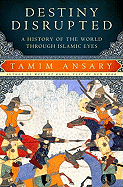

Ansary states that the emphasis in Islam is not on personal salvation of the isolated soul (as in Christianity) but on construction of the perfect community; Islam is something one does. In the mid-11th century Islam's scholars, philosophers and Sufi mystics were hard at work "to establish Islamic doctrine and law in full; to unravel the patterns and principle of the natural world; and to develop a technique for achieving personal union with God." Their efforts spread Islamic religion and culture so widely that Islam came to regard itself as the world, with all outside as irrelevant; Ansary writes that by 1600 any objective observer of the Muslim empires and their frontier territories would agree.
Ansary argues that Islam proceeded through time without being particularly aware of (or concerned about) the Western experience (and vice versa), until, that is, the Industrial Revolution in the West and the Age of Imperialism. But "by 1850, Europeans controlled every part of the world that had once called itself Dar-al-Islam." And so began the complex fall-out of the collision of perspectives that we continue to struggle to reconcile today: Islam seeing the West as invaders, occupiers and imperialists, and the West viewing itself as a savior bringing Islam all the benefits of an industrialized democratic world. Among examples of the distinctly different perspectives in play, Ansary reminds readers that when war broke out in Europe in 1914, the Muslim world considered it a European civil war while to the West, of course, it was the Great War, later dubbed World War I. There are even more widely divergent opinions concerning Israel, and Ansary cogently analyzes why a peaceful resolution on that question remains out of reach today. In covering events and conflicts we've witnessed in the past 30 years, Destiny Disrupted illuminates the cultural, historical and diplomatic challenges we face to promote greater understanding between Islam and the West.--John McFarland
Shelf Talker: A lively, thorough and accessible survey of the history of Islam (both the religion and its political dimension) that explores many of the disconnects between Islam and the West.

